Public School Magazine, May 1901
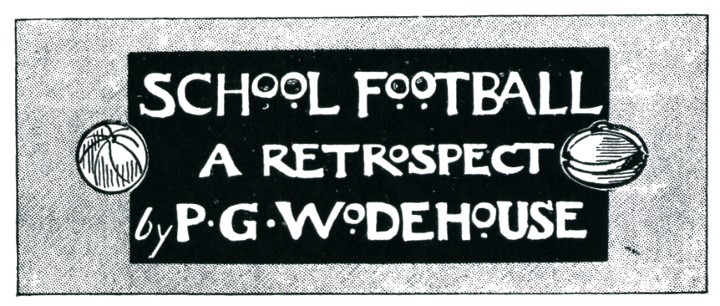
ENGLISH Schools—this retrospect does not deal with the Scottish School Championship—may be divided (footbally speaking) into four groups, two Rugby and two Association. Of Rugby-playing Schools, Rugby, Uppingham, and Cheltenham form one group; Bedford Grammar School, Haileybury, Dulwich, Tonbridge, Merchant Taylors’, The Leys, Saint Paul’s, and Sherborne the other. Of the devotees of socker, Charterhouse and Westminster may be classed together; the other group consisting of Malvern, Shrewsbury, Repton, and Radley. Besides these there are, of course, numerous other schools playing both branches of the game, and playing them well, such as Clifton, Marlborough, Wellington, Brighton, Rossall, and others, which do not, however, fall into any particular group. Very well, then, Retrospectemus.
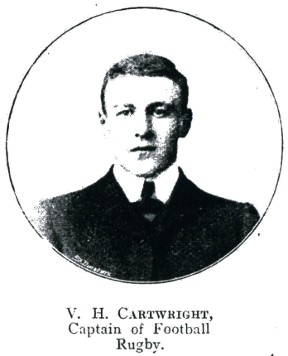
The Rugby team of 1900-1 was probably the strongest school side there has been for many years. With four old colours, V. H. Cartwright (the captain), F. W. Bolton, H. D. Lloyd, and F. C. M. Cruickshank, and a pack of forwards averaging twelve stone three, they were decidedly a team one would rather meet at ping-pong or dominoes than on the football field. Out of the ten matches played, eight were won, including the only two school matches, Cheltenham and Uppingham. Against the former, Rugby scored nine times (29 points to 8), while the latter match ended in an extraordinary walk-over, for the Rugbeians ran up 58 points to nil, crossing their opponents’ line seventeen times. A wonderful score this,—in a school match especially.
The rest of the season showed the following results:—Oxford University (19 points to 8), Corpus, Oxford (37 to nil), Balliol (19 to 8), Cambridge Old Rugbeians (37 to 8), Balliol (27 to 3), Harlequins (39 to 20). The two defeats were at the hands of University College, Oxford (8 to 19), and Rugby Town (5 to 18). It is only fair to the school to say, that in the last-named match they were playing far below their full strength.
Of Cheltenham and Uppingham, the other two schools of the Rugby group, the former had the best record, winning five and losing seven, against Uppingham’s three victories and nine defeats.
Cheltenham started the season, under the leadership of K. R. B. Fry, with a defeat at the hands of H. V. Page’s XV. (16—20). On October 24th, R. S. V. Dyas, captain of the London Welsh, brought down a very strong team to the College, and defeated them in spite of plucky play all through the team, by 24 points to 10. A third match was lost by 47 points to 5, that against Cardiff “A.” Two victories, against R.A.C., Cirencester, and Clifton Club, followed by a loss (Oxford “A”), filled up the interval before the Rugby match. After this the school began to improve matters, winning three out of the last four games. The last match of the season (v. Cheltenham Town) was won by 8 to 3, the play of the College being at its very best.
Uppingham, captained by C. G. Liddell, were not so successful as usual this season. A victory over R. N. Douglas’ XV., sandwiched in between three defeats before and three after, were the results of the term’s play up to the day of the Rugby match. The school then won two matches v. T. A. Gibson’s XV. and R. N. Douglas’ XV., by good margins, but lost the last two, against the Old Boys and C. J. Newbold’s team, the former by 32 points. On the who1e rather an off-season for a school with Uppingham’s record.
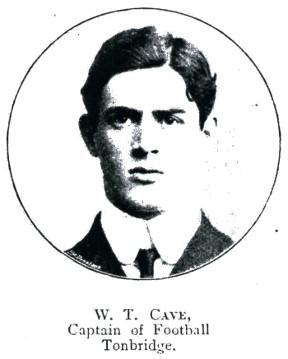
In the next group there was one school a head and shoulders above the rest. This was Bedford Grammar School, who had a really wonderful season. A match between Bedford and Rugby would have made a fine game, but, unfortunately, the two teams do not meet in what Mr. Anstey calls “the mimic warfare.” The school always turns out an excellent team, especially outside the scrum, the three-quarter line working like a machine. This year saw an unusually good set of forwards aided and abetted by equally good outsides. The result was that out of fifteen matches played, twelve were won, nearly all by wide margins, two drawn, and only one lost. C. H. Bligh was captain before Christmas, a half-back of many years experience in the team. After Christmas F. G. Brooks, the school sprinter, reigned in his stead. The season opened with an easy victory over R. C. Grellet’s XV., followed by two drawn games with Blackheath “A” and Rosslyn Park “A.” This brought on two school matches, versus Dulwich and St. Paul’s, in which Bedford scored 80 points without having their line crossed, 28 v. the former, 52 v. the latter. From this time till the end of the term there was an unbroken series of seven victories, the school notching 34 points v. Royal School of Mines, 14 v. St. John’s College, Oxford, 34 v. Haileybury, 5 v. Olney, 21 v. Old Boys, 25 v. C. M. Harris’s XV., and 16 in another Old Boys’ match. The Easter Term opened with what was perhaps the most creditable victory of the season, namely, that over a very strong Trinity (Cambridge) XV., which included such celebrities as Greenlees, Sagar, and Drysdale, whom they defeated by 22 points to eight. What made the victory more remarkable was the fact that eight of the school team were members of the second fifteen. Merchant Taylors’, the last school played, were met and beaten by 33 points to nil, F. G. Brooks scoring no less than five times. The last game of the season was with R. C. Grellett’s team, a very strong lot indeed. This was the only defeat, but it was a handsome one by thirty-three points to nothing.
Haileybury had, as usual, a heavy pack of forwards, who contributed largely to the victories that adorn the fixture-card. Only two old colours remained, E. C. Hodges, the captain, and G. S. Oddie. The season was on the whole good. Defeats at the hands of Richmond “A” and Marlborough Blues opened the card. Then came a victory over Blackheath “A,” and a draw with Tonbridge. In this match it was a question between smart three-quarters and a heavy scrum, and the result proved that the one counterbalanced the other. Bedford, as has already been said, ran up a large score against the school, but a week later the Dulwich match was won by 12 points to nil, on a wet day, which enabled the weight of the Haileybury pack to tell. The rest of the season showed victories only, the victims being Wadham, Pembroke (Cambridge), and C. J. Reid’s team.
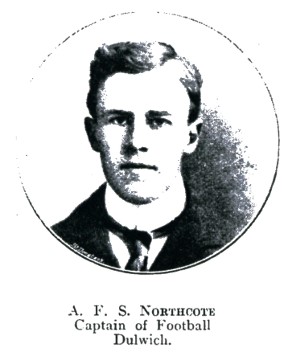
Dulwich, weakened by the loss of Sherlock and Wright, owing to injuries, had, on the whole, a mediocre team. The best performances were in the St. Paul’s match, where they ran up 21 points to 8, and the Tonbridge match, which ended in a draw of 11 points each. The weak point of the play was the tackling, the attack being good. The season ended happily with two victories.
Tonbridge must be ranked second to Bedford in this group. An excellent pack, headed by W. T. Cave, were backed up by a smart set of three-quarters, of whom Hancock was probably the best. Of the school matches played, two were drawn (v. Dulwich and Haileybury), and two won, the St. Paul’s match, by 54 points to 3, the Sherborne match by 40 points to 3. The record of the season was nine won, two drawn, and two lost, a list not very far behind that of Bedford.
Of the other schools in this group Merchant Taylors’, had a very good team, although the Bedford match ended so disastrously. Their strong point was their captain, Raphael, a three-quarter of unusual brilliance, especially in the attack. He achieved the remarkable feat of playing for Surrey and the Old Merchant Taylors’ team while still at school. The best item on a successful card was the defeat of Dulwich by a substantial score after five years of hope deferred.
Sherborne and The Leys both did as well as usual, but St. Paul’s were lamentably weak this season, failing badly against Bedford, Dulwich, Tonbridge, Old Alleynians, and other teams.
In the first group of the devotees of socker, Malvern probably take first place. Balfour-Melville captained the team. The first match was lost by 1 goal to 2. Then followed three victories, over B.N.C., St. John’s College, and Repton. The Repton match was a fine game, both sides playing their very hardest and best. In the end the superior stamina of the Malvern forwards gave them victory by 4 goals to 3. The next school match was against Shrewsbury. This resulted in a draw of 2 goals each. Radley were easily defeated by 8 to 2, but a strong O.M. team, which included Burnup and R. E. Foster, ran up 6 points to nil. The result of the season’s play was six won, two drawn, and two lost. Conspicuous members of the team were Evans (of racquets fame), Powell, and the goal-keeper, Rogers.
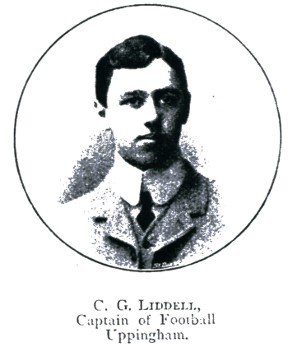
Of the doings of Shrewsbury I have been unable to obtain any details. They beat Repton and drew with Malvern, but the rest, to the present writer at any rate, is “wropped in mystery.” Repton did not do so well as usual this year. This may be explained by the lack of old colours, only two of last year’s team remaining. These two, Lovatt and Musker, both played with success throughout the season, as did Smith, Bampfield, and Birks, though the latter’s career was cut short by an injury in the Shrewsbury match, which prevented him playing again.
In the last group, Charterhouse was certainly a long way better than Westminster, who had a distinctly poor season. Charterhouse was captained by B. Tuff, and won their only school match, against Westminster, by 6 goals to nothing. Other successes were against Guildford, Weybridge, R.M.C. Sandhurst, Magdelene, Oxford, and R. Trower’s team. Defeats were administered by A. H. Tod’s team, O. C. Internationals, and Casuals.
And here, as we say on the Classical, the MS. abruptly ends.
Note.—In this retrospect the doings of Eton, Harrow, and Winchester, have been omitted, as these schools play neither Rugby nor Association.
P. G. W.
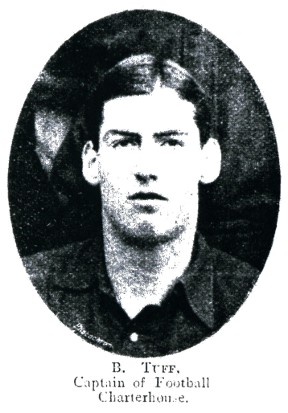
 Madame Eulalie’s Rare Plums
Madame Eulalie’s Rare Plums